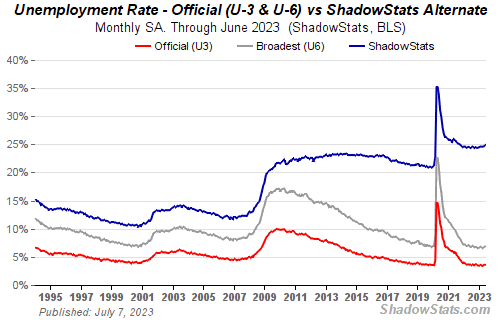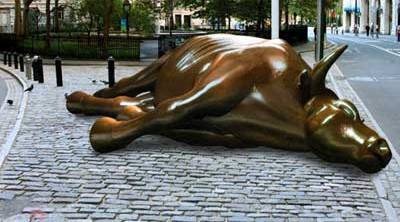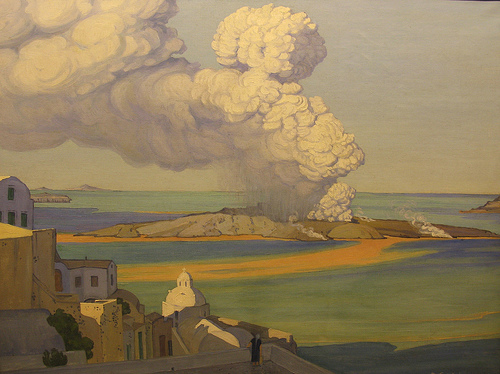Economic News 2009, Economy News & Analysis 2009
Please note that we are not authorised to provide any investment advice. The content on this page is for information purposes only.
27 December 2009. David Caploe PhD, Chief Political Economist, EconomyWatch.com. While it lacked the dramatics of a 2008 that featured a Black September that will go down in history as one of the most chaotic and fear-inspiring episodes in modern financial & economic history, 2009 has been pretty rough in most places.In that context, here are our Top Five Christmas wishes for the world political economy as it concludes a roller-coaster of what Queen Elizabeth, in a different context, called, an “annus horribilus”.
22 December 2009. David Caploe, PhD, Chief Politcal Economist, EconomyWatch.com. The Copenhagen environmental talks ended in a weak, informal “agreement” that some called the end of the UN-based world ecological process that began in the early 1990s with the Rio de Janeiro meetings. There were, however, some significant events – which bodes even worse for our global future. Take the extraordinary blow-up between the US and China at the climactic moment of negotiations, involving both Chinese Premier Wen Jiabao and President Barack Obama personally.
19 December 2009. By David Caploe PhD, Chief Political Economist, EconomyWatch.com. While it wouldn’t take much to have a more activist response than the downright laissez-faire – and, consequently, increasingly irrelevant – approach of the Obama administration to the steadily deteriorating economic / financial situation, the UK government of Gordon Brown and Chancellor of the Exchequer [Treasury Secretary] Alistair Darling – are at least doing something, albeit not too much either.
17 December 2009. By David Caploe PhD, Chief Political Economist During the decade after the 1997 Asian financial crisis, China was generally seen throughout East Asia as a friendly alternative power-center to the American-led Washington-consensus. But in the last couple of years, some of China’s neighbours are beginning to wonder if ‘friendly uncle’ is more of a ‘roaring dragon’, one which ironically its own people might have the most to fear from.
15 December 2009. By David Caploe PhD, Chief Political Economist, EconomyWatch.com. In a global economic scene dominated by continuing uncertainty, one of the few “sure bets” has SEEMED to be the “green tech / clean tech” – whatever you want to call it – sector.
11 December 2009. By David Caploe PhD, Chief Political Economist, EconomyWatch.com.It was a great relief to the world that Obama replaced the no-bid-contracts gang of Bush and Cheney, bringing a more civilized face to leadership of the world’s key economy. But being the not-Bush is not enough. Instead of implementing the policy of Change that he promised us, he has taken a frighteningly casual business-as-usual approach, making himself increasingly irrelevant even as he accepts the Nobel Peace Prize.

Obama begs for help
while the middlemen chortle into their Veuve Cliquot
8 December 2009. By David Caploe PhD, Chief Political Economist, EconomyWatch.com.On 4 key policy fronts, Obama is making the same mistake. From the Too Big to Fail Banks to the health “care” debate, and from the collapse of the housing market to the mystifying “double-down” on Afghanistan, Obama is relying on middlemen to carry out his policies. And while he begs them for help, they chortle into their Veuve Cliquot.
7 December 2009. By David Caploe PhD, Chief Political Economist, EconomyWatch.com. The economic collapse of the United States has its roots in a political failure in which politicians serve the interests of their sponsors on K Street and Wall Street, rather than the American people. This process was started by Reagan/ism, pushed to new heights by Bush and Cheney, and obediently continued by Obama. Unless real change is enacted, the US is rushing headlong into an economic and political Nietzschean abyss.
4 December 2009. India’s economy is primarily driven by consumption, and yet with most of the population earning less than $2.50 a day, there is clearly massive potential for real growth – i.e. not debt-based and driven by necessities and small luxuries. Yet massive challenges remain. We review an economic report, things we agree with in part – boosting agricultural productivity, improving governance and infrastructure, more trade, less inflation and better education – but violently oppose in it’s support of liberalizing the financial markets.
3 December 2009. Take a look at the top consumer trends for 2009 from TrendWatching.com, from Business As Unusual, or the movement against greed and towards transparency (despite gun toting Goldman execs), to Eco-Easy (and its counter force, Eco-Uneasy) and Embedded Generousity, where anything you buy will cause a donation to someone less needy. We also highlight Urbany, the fact that more than half of the world’s population lives in cities as of about now, and what changes that will herald.
2 December 2009. Goldman executives, frightened by the growing anger against their company, are taking up guns to protect themselves. Humility, an apology or two and less bonus payments would be a much better way of deflecting that anger, but of course Goldmanites want to take those bumper bonuses – half of their total profits, backstopped by the taxpayer – and are therefore preparing for the worst. Ironically, it is their bonuses that may finally alert the public to what former Treasury Paulson feared the most – the revelation that the system is not designed to protect the free market, but the lack of one.
27 November 2009. State-owned Holding Company Dubai World has just stopped repayments on $59 billion of debt, including a $3.5 billion Nakheel bond due 14 Dec. The markets see this effectively as a default, and they have been shaken out of their complacency. European markets are down 3%, the most since the March rebound, with banking and construction stocks leading the bloodshed.Dubai’s sovereign debt has been downgraded, its borrowing costs have risen 50%, as they have in Turkey, Russia and South Africa.
25 November 2009. The luxury goods market is in crisis. It is expected to plummet by 16% in the US alone, where de-blinging is the order of the day both financially and psychologically. And yet in China luxury is going to grow by 12%, and this sudden and unexpected change will put China at the top of the world luxury pecking order.
23 November 2009. We generally assume that the boom and bust cycle is bad and to be avoided – but maybe there are financial interests that want the boom and bust cycle to continue and grow, as they amass vast wealth in the process?
20 November 2009. The Federal Reserve is a private bank. While this is not new – it has been this way since 1913 – it is certainly news to most people. The Fed is owned 100% by shareholders, who are all private banks. The express purpose of the Federal Reserve Act was and is to protect private banks, not the government. That is why great figures such as Jefferson and Lincoln bitterly opposed the bankers and their financing systems, fearing them more than standing armies.
18 November 2009. There is an elephant in the room, and it is hard to write about anything else while that is the case. The financial system in the US and Europe needs to be reformed. Not in the way that the regulation currently going through the House and Senate calls for. That is not real reform – it entrenches Too Big to Fail and still allows hundreds of trillions of dollars – more than the entire GDP of the world – to be traded in secret. Lets just say that with the banks financing politicians campaigns, they are getting their money’s worth, and driving the US into ever deeper debt. Real reform is based on transparency, increased capital requirements, transaction taxes and the break up of Too Big to Fail firms.
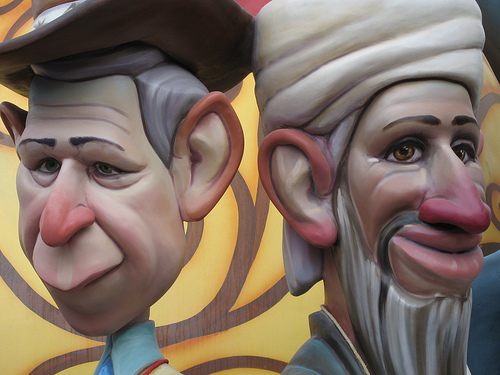
Was Osama Bin Laden more successful than we realised? Credit:Xixarel1
17 November 2009. When Osama and Al-Qaeda launched the 9/11 attacks, they aimed to shake the foundations of western capitalism. Although the official line is that they failed to do that – and, indeed, that he is now somewhat irrelevant since we have ‘won’ the War on Terror – the measures used to contain the negative effects of the attacks involved pumping the system with cheap money. That liquidity helped to build up the asset price bubbles, bank leverage levels and global trade imbalances that imploded so successfully (from Osama’s point of view) in the Financial Crisis. Now, we not only have to ask ourselves whether he planned this or got lucky; our more pressing question is what happens next, since the problems in the system have not been fixed.

Indian Harvest: A Second Green Revolution Needed. Credit: RajKumar
13 November 2009. Despite its economic successes, India leads the world in hunger. The monsoon failure, followed by torrential rains at the end of the season that destroyed more crops, has led to growth in the numbers of food insecure to an estimated 220 million. While the government has done will to increase access to funds, the key is technology. A second Green Revolution is needed to take advantage of less thirsty crop varieties, sprinklers to reduce water usage, and even lasers to level fields.
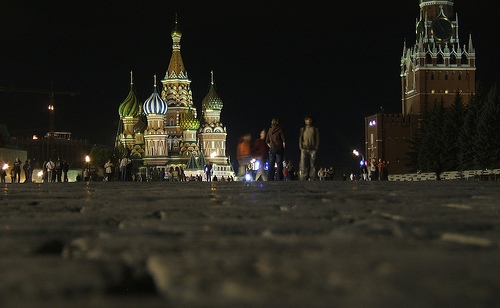
Kremlin Wars: Political Infighting with an Economic Twist. Source:Satbir
12 November 2009. Sweeping economic reforms have been announced in Russia, that could see the major state-supported companies restructured. Western media have trumpeted this as President Medvedev going after former President Putin and his allies, but they are wrong. It is a factional clan fight happening beneath them, between the FSB (KGB) linked siloviki who control those companies, and the rising technocrats of the civiliki. The outcome of this fight will shape Russian politics and economics for years to come.

Ireland – The Worst Economy in the World? Credit:TheLizardQueen
11 November 2009. What will are expected the worst economic crashes that happen in 2010? The list is dominated by European countries, so much so that we must stop talking about the sick man of Europe. Now we need to talk about Europe as the sick continent of the world. Indeed, out of the top 12 countries on the disaster list, only one – Equatorial Guinea, scene of corruption, embezzled oil money and attempted coups – is not European. Leading the pack are Ireland, a microcosm of the US but without their own reserve currency to fall back on, and Lithuania, once a proud Baltic Tiger but now struggling with debt and a lack of export orders.
5 November 2009. Forget what the Happy Clappy Fed is saying, and ignore the frothing talking heads on TV. The US stimulus has had a positive impact, but it is not enough. Paul Krugman does the math – if you don’t want to see high unemployment for the next decade – and that is the real generational theft going on here – then we need a second stimulus.
4 November 2009. Too Big To Fail. Government Bailout. Protectionism. 2009 was the Year of Big. It seems we have forgotten about entrepreneurialism. It is therefore refreshing to read the op ed of Jack Ma, founder of Alibaba.com, calling for greater support for entrepreneurs, the innovation engine of the economy. While we agree with his vision of a world where 1 billion people buy products and services online daily, we can’t help but question his motives for regulatory support.
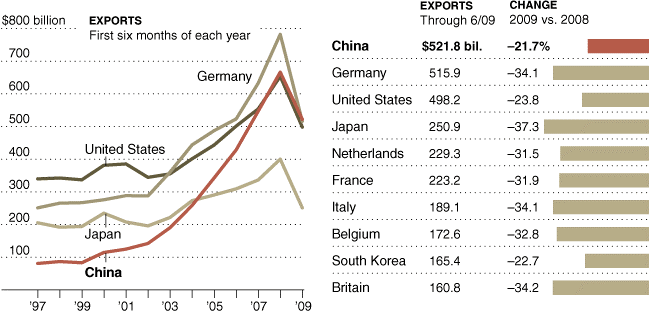
China Becomes the World’s Largest Exporter – By Falling Less.
Source: NY Times/ Global Trade Atlas.
3 November 2009. World trade collapsed in 2009 – but China dropped less than Germany, Japan and the US, thanks to aggressive price cutting, and it has now become the world’s largest exporter. With its focus on the ‘Walmart Gang’ and with growing unemployment and stagnating wages in the US, that lead is only going to grow, despite an increasing number of trade spats.
30 October 2009. Some of the best returns for investors over the coming years will be in the Frontier Markets, tomorrow’s version of the ‘Asian Tigers’. And while markets like Kazakhstan carry risk, we would argue that there is might well be more risk in the low-growth/ high-debt developed economies than a well managed and diversified frontier fund.

The RBI is Keeping the Indian Economy and Banks in Rude Health. Source: FormatBrain
28 October 2009. The press have been complaining about the Reserve Bank of India’s latest policy moves, and the stock market tanked. But the analysts have failed to see the bigger picture; the RBI is essentially declaring the end of the Financial Crisis in India, and taking moves to strengthen the long term fundamentals the economy and particularly the banks, who are in much ruder health than their western counterparts.
27 October 2009. US consumers are the demand engine of the global economy. The whole world is therefore waiting on tenderhooks to see if and when the official US unemployment level crosses the 10% threshold. The shocking truth is that the real unemployment level is already more than 20%, but has been manipulated by politically motivated tampering to show smaller figures.
26 October 2009. Crisis? What crisis? That seems to be the message for investors nowadays. Naysayers are labelled permabears and the boosters point to many mistaken forecasts of a suckers rally during the last few months as evidence not to listen to sceptics. Fundamentals still matter, however, and the fundamentals say that the US economy, and most of the G7s for that matter, is still in crisis. Here are four reasons why this still is a Sucker’s Rally.
23 October 2009. The United Nations has said that, for the first time in history, there are more than 1 billion people going hungry. This number has jumped by 100 million as a direct result of the Financial Crisis. Hunger is no longer a result of droughts or other natural causes – it is now primarily a man made problem. Bill Gates has announced that fighting hunger will now be the main focus of the Gates Foundation, but more is needed; as in so many other cases, reform of the financial system is needed to change the dynamics of hunger.
19 October 2009.Although Sovereign Wealth Funds, or SWFs, still represent a small percentage of total world finance, with the Top 12 alone holding close to $3.2 trillion in assets they are big, and you can rest assured they plan on getting bigger. We analyze the top SWFs and what impact they are having on world finance.
16 October 2009. Banks control US policy by funding the campaigns of both parties and hiring lobbyists. The returns they achieve are astronomical. Take Citigroup for example. If it was a normal company, it would be out of business by now. Instead it has invested $11 million for a $50 billion bailout. That is a staggering ROI of 401,194%.
15 October 2009. After big outflows at the end of last year and the start of this, both FDI and FII investment in India is on a tear. While at first sight this looks like a great thing, is it really? We take you through the reasons for optimism – and the dangers lurking.
Treasury Secretary Henry Paulson cajoled the nine largest banks in the US to sell $250 billion of shares yesterday. This is the largest US taxpayer-funded rescue plan of banks ever, and not everybody is happy.
13 October 2009. You probably know that growth in the West will be miniscule, and that China and India will lead in Asia – but did you know that global economic growth in 2010 will be led by Qatar, Botswana, Azerbaijan and Congo?
25 September, 2009. By David Caploe PhD, Chief Political Economist. By the time Friday rolls around, there’s a natural tendency to want to chill out a bit, especially after the brutal week – nothing to do with my colleagues at Economy Watch, thankfully – I’ve experienced … but then you start to check websites, ideas start bouncing around and it becomes impossible not to start seeing new – and not especially happy – connections
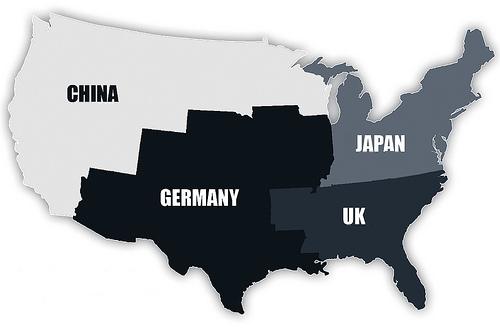
China/ Japan: China Overtakes Japan, But Real Lesson May Be For the US
By David Caploe PhD, Chief Political Economist.. A provocative piece in the New York Times weighs in on a common discussion topic in Asia: what does China’s “rise” mean for the future of not just Asia but the entire world?
8 October 2009. We have just been through the worst Financial Crisis in living memory – but you need to know now that there will be another Financial Crisis, and the next one is likely to be even worse. When will it hit? And what will it mean in terms of growth, jobs, houses, stock markets and trade? How can we get prepared? To help you understand what is going to happen to the world economy in 2010, we have prepared reports on the two economies that count – the US and China
10 October 2010. Gold is the New Black for traders, but not all of the reasons are sound, and a massive new bubble could be getting build. Here are five reasons why.
5 Oct 2009. Economists are getting excited about China overtaking Japan as the second largest economy in the world, within the next year or so. Although the Chinese would do well to look at the export-oriented growth policies – and mistakes – of the Japanese, it is perhaps the US that really needs to heed the lesson of decline in Japan, with its zombie banks, Lost Decade and continued lack of growth. For the US appears hell-bent on following the same path, and that will have disasterous consequences for all of us.
1 October, 2009. The five largest banks in the UK have voluntarily agreed to limit their bonuses for 2009. This could become a moral victory for embattled Prime Minister Gordon Brown, who has gone back to the traditional Labour policy of fighting for the little person against the fat cats. This is in stark contrast to Obama, who has become the Why Change? President as far as the banks are concerned.
30 Septmber 2009. 400 million Indians still don’t even have electricity, yet India is already the world’s third largest polluter. This an environmental crisis all of its own. India’s controversial answer: nuclear power on an unprecendented scale, using technology that does not even exist yet.
The global economy has been built around the US consumer since 1947. US consumers, however, won’t resume buying until they have jobs and can keep them. Since US Unemployment won’t drop any time soon, the world economy is still mired in difficulty.
25 Sep 2009. The necessary global economic leadership needed to get us out of the mess we are in seems absent, with the possible exception of China.
One of the few relatively recession-proof industries is education. With exponentially growing numbers of Chinese and Indians being willing and able to buy higher ed, Hong Kong, Singapore and Malaysia are looking to capitalize on that demand.
23 September 2009. By David Caploe PhD, Chief Political Economist. The Chinese are using a mixture of aid and trade to expand their influence internationally, sometimes in dubious ways. But before westerners get too high-and-mighty about these sort of practices, they would do well to remember that the US/ Europe/ Japan travelled this path for decades.
David Caploe PhD, Chief Political Economist. Although China and the US are now so intertwined economically they are called Chimerica, and although there are clearly problems with how bank loans in China are being given out and spent, China is clearly in ruder economic health than the US.
What happens when corporations hold sway over the government agencies that are supposed to regulate them? Corruption, loss of income for Americans, and a sleazefest that reads like a script from a tv miniseries — and one that cannot air during family viewing time.
17 September, 2009 By David Caploe PhD, Chief Political Economist, EconomyWatch.com The reason a problem in the money world was magnified into a Global Great Recession in the real economy was derivatives deregulation – championed under Clinton by Robert Rubin and his acolytes, now National Economic Council head Larry Summers and, as Treasury Secretary, former New York Fed head Tim Geithner. Real change would have come from putting someone like Nobel Prize Joseph Stiglitz in charge.
Shakespeare said First, Kill all the Lawyers – but today it is bank accountants who do the most damage, hiding the truth by changing, subverting or ignoring disclosure rules. More pheasant, anyone?
While Obama panders to Wall St, Judge Rakoff rules that the settlement between the SEC and the Bank of America was an illegal act of collusion.
Has anything changed on Wall Street after the crash? Maybe, but its hard to see what.
Introducing David Caploe PhD, the new Chief Political Economist of EconomyWatch.com, who will lead what has become the largest independent economics community online (with over 500,000 participants) to new heights. Dr David has studied at Harvard and Princeton, and has since taught, written and filmed around the world.
After the ‘summer of discontent’ when it seemed like President Obama’s signature reform of the US Healthcare industry was on the ropes, his primetime address to both Houses today has been heralded as a pivotal victory. Obama said ‘I am not the first President to take up the cause of healthcare reform, but I intend to be the last.’ Early polling after the speech was delivered suggests he has the backing of the majority of Americans, and the Democrats have working majorities in both houses. Despite the legislative hurdles, we believe that Obamacare is coming – but why is it so important?
If you are an emerging markets investor, you may be forgiven for asking ‘Financial Crisis? What Financial Crisis?’ – because emerging market stocks are now back at pre-crisis, pre-Lehman collapse levels. Whether this level is sustainable is an altogether different question.
Vienna, Austria, 6 September 2009. Coffee shop talk among economists, investors and business people alike has increasingly turned to one topic; what shape will the recovery take. And the discussion sounds more like an episode of Sesame Street with each passing day.
October, for many investors, is the bogeyman month. It is the month when you need to be out of the market or risk losing your pants. This ‘truth’ is so deeply ingrained in the seasoned investor’s psyche that the real truth may come as a bit of a surprise.
I think we’ll lose 1,000 banks out of the system…over the next two years. We’ve already lost 81 this year. The numbers are climbing everyday. Now many of these institutions nobody has heard of,” said John Kanas, whose firm bought over Florida’s BankUnited in May.
At any Olympic games, the big powerful countries always seem to win. China, the US, the UK, Russia, Japan, and Germany are usually at the top of the list. Every now and then some obscure nation may win a medal or two. How were the Beijing games any different? Were GDP and winnings comparable?
There is a lot of talk of the balance of power shifting from the West to Asia, but is it really happening? According to the list of the largest companies in the world in by market capitalization in 2009 – yes it is.
Veteran investor Jim Rogers is confident sugar trading will return some sweet profits in the coming years. Rogers knows a thing or two about profits, having founded The Quantum Fund with George Soros in 1970. But why sugar?
For seven years, India has enjoyed good rains – admittedly sometimes too good – and farmers and the retailers who served them have prospered. With more than half the country now experiencing drought, the good times have come to an end.
A number of indicators are pointing to the fact that the global recession is ending now. If true, this marks a turning point for the world, which has suffered its worst recession since the Great Depression and World War II.
Western Economists have long attacked China’s trade surplus as being a great source of economic imbalance in the world – but it is investment that is the real imbalance.
It appears exchanges are conspiring with a privileged group of high-frequency traders in a massive fraud, says Fund Manager Whitney Tilson.
The IEA has warned that oil prices above $70 could stop the global economic recovery. Will prices stay above that level?
Aah. Brasil. Endless sandy beaches. Beautiful boys juggle footballs, the girls sun their perfect bodies, ready for carnival. A place of pleasure, certainly, but not a place where money is invested wisely, surely?
Monday’s landslide elections which saw the Democratic Party of Japan (DPJ) assume control after nearly 50 years of LDP rule beg one question: Will the new party be able to pull Japan out of its economic troubles?
Singapore GDP Rockets Up 20.7 Per Cent in Q2 2009 – Is the Boom Back? Or is the V-shaped recovery actually the first part of a W?
Geography plays a major role in the economies of countries and regions. Rivers offer irrigation and shipping, and ports give access to international trade. The US, Russia, China, and Europe all have dissimilar geographies, and thus their economic mandates and priorities are different.
Geography has always been against the Russian economy, inevitably leading to authoritarian rule of this vast country.
In the fourth part of our series on Economic Geography, we look at how Europe gave rise to modern economics, but how it is now showing signs of age
Geography plays a major role in the economies of countries and regions. Rivers offer irrigation and shipping, and ports give access to international trade. The US, Russia, China, and Europe all have dissimilar geographies, and thus their economic mandates and priorities are different.
The Nabucco pipeline is supposed to free much of Europe and Central Asia from their dependency on Russia for energy, but it is also fast becoming a pivot point for negotiations in Ankara’s aspirations.
With the re-election of Indonesian President Susilo Bambang Yudhoyono, the nation is watching to see if he can live up to his reform promises and continue economic growth.
As the US accuses Mexico of supplying an endless supply of drugs to its 50 states, Mexico’s standard response is that the US arms these same drug dealers with its guns.
The WTO reported that world trade will slide 10 percent in 2009, with Asia being the leader in the recovery. The WTO’s June forecast was that global trade would drop only 9 percent.
With Oakland, California passing a law approving marijuana tax, opponents warn of heavier crime, more drug use, and only marginal revenues. Supporters claim it will raise much-needed funds in a city that has a massive deficit.
As most of the Western world sees a dramatic decline in print media revenues India is witnessing a new era in newspaper, TV, radio and web growth.
China is growing at an amazing rate, and when the global economic crisis comes to a close this incredible power will inevitably emerge with more momentum than ever. But this has to taper off eventually, and when it does, it will be more than just a decline. We will see that great bubble burst.
It’s consumer confidence that drives markets and precedes recovery, and if the latest poll about economic sentiment around the world means anything, we could be in for good times.
As Americans, we often jokingly poke fun at our northern neighbor by referring to Canada as the 51st state. We say they talk funny; their baseball is no good, and their beer is overpriced. And don’t forget the ice hockey jokes. But really, I think we’re just jealous.
Predicting markets is something that investors have been trying to do for centuries, with limited success. What if you had the key to real estate forecasting? There are a few models which may hold the secret.
A groundbreaking project to build massive solar farms in North African and the Middle East to supply Europe with clean power has begun.
With interest rates at record lows, does it make sense for homeowners to look at home loan or mortgage refinancing? This is an updated guide to help you understand what refinance is, whether mortgage refi is for you, and how to go about finding the best refinancing package. “>
Both Clinton and Obama were elected with key policy plans for healthcare. Clinton’s didn’t work out so well. While Obama is still popular, his ratings are starting to suffer during uncertain economic times and unproven healthcare policy. Will his healthcare plans fail too?
EconomyWatch Special Report – Surge of Interest in Methods of Reducing Petrol and Gasoline Costs. Sky high oil prices are leading to a lot of innovation in the world of energy efficiency, with new methods to extract hydrogen from water and mix it with petrol & gasoline attracting a lot of attention.
A total solar eclipse darkened much of India, China, Iwo Jima Japan, and other parts of Asia today. Superstition and old wives’ tales seemed to prevail, and the most interesting was perhaps that India’s SESNEX would drop.
Indian Economy: Why Risk Losing Office over a Nuclear Deal?
By ˜free economy” we are not talking about an economic system or even Friedman’s admiration for economic freedom. We are talking about gratis, on the house, free of charge.
$5 trillion is needed by governments around the world to pay for deficit spending for the rest of the year, and the US will need about $3 trillion of that. Where will it all come from?
The Latvian Hooker Index is not showing any signs that the economy is on a rebound. Prices still linger at around US $60, showing signs of deflation and a general slump in the Baltics.
Traditional print media is struggling to survive with the ubiquity of the web, citizen reporters, and media habits we don’t even understand yet.
As Goldman Sachs announces $3.4 billion in profit for the second quarter, people are wondering if it will return to its old practice of massive bonuses and huge pay, and whether or not such excesses will be at the taxpayers’ expense.
China is extending its investigation into the Rio Tinto crackdown to other mining firms. Tensions rise as the nation attempts to tighten its grip on corruption and social unrest during these times of economic chaos.
The Delhi metro was supposed to be the best run project in India, an example of the new modern infrastructure that would transform the country. In reality, it is an example of the corruption, greed and incompetence – the same old India but with more money.
It is often said that those who do not remember the past are doomed to repeat it. With economics it’s no different, considering the world has experienced dozens of crashes and recessions, undoubtedly caused by acquisitive traders and lawmakers with few memories of the past. So let us review past crashes – hopefully we won’t repeat them.
As Wall Street shows signs of recovery, many investors are watching emerging markets. They could very well prove to be the markets to invest in as we pull out of the economic crisis.
Obama’s stimulus package has been criticized for being both too small and too big, but most economists are against more such stimulus, despite the dismal economic outlook.
After two years of cuts in forecasts, the IMF has upgraded its world growth forecast for 2010 to 2.5 per cent.
India’s 2009-10 budget was announced yesterday which gives increases in personal tax exemption limits. It also enacts a wide rage of stimulus measures spanning a variety of industries. This is despite a growing fiscal deficit.
Iraq is in the process of holding auctions for energy contracts to develop its massive oil fields, the third largest reserves in the world. The first auction was just completed, and only closed one deal. The Chinese were part of every consortium that bid and want to win even if they lose money – which is handy, because the Iraqi’s don’t want anyone to make too big a profit.
Loan sharks thrive in times of economic trouble, but their costs can be much more than the exorbitant interest charged.
India could achieve 7 Per Cent GDP growth in 2009, and then return its previous 9 per cent plus showing from 2010, but only if significant financial reforms are enacted. That was the verdict of the annual India Economic Survey of 2008 – 2009.”>
As Bernie Madoff is sentenced to 150 years in prison some think he’s merely a scapegoat in what many call the end of capitalism. While his $65 billion fraud ruined the lives of thousands, Wall St titans have left all of us – and our children – with gargantuan debts.
It’s no secret that for some time now, China has toyed with the idea of moving away from the US dollar as its reserve currency. And that desire has probably never been stronger as China shudders at the thought of US dollar inflation which would slash the value of its 1.3 trillion in US reserves.
Men caused the global recession, and now they are the ones hurting. At least that’s what those who dub it a he-cession (or hecession) claim.
It’s sex that creates economic peaks and troughs. The number of babies born in a certain time can largely predict economic trends with surprising accuracy. In fact, in 1999, Harry S. Dent predicted that the economy would crash in about 2009.
Internet advertising in the US adds about $300 billion to the economy, amounting to 2.1 percent of the GDP. This is good news during the worst economic recession since the 30s.
An introduction to the forex market and forex trading – interview with eToro’s Jeff Hardy.”>
Wealth is going east, and the wealthiest nations for those looking to make money are in Russia, the Middle East and Asia”>
The rankings of the worlds top banks has changed significantly through the Financial Crisis, with big names falling by the wayside but others rising to take their place.”>
New York, US, 24 June 2009. The Market Rally that started in March may finally be over, having got ahead of itself – and the economic realities that we still face. As markets have tumbled this week, the technicals have started to come in-line with the fundamentals.
Traditional media’s business model is dying, and their reponse to the ban on foreign journalists covering the Iranian crisis is only accelerating that process.
This stereotypical, male-dominated breed of corporate samurai seems to be dying, along with Japan’s economy. Enter the grass-eater: A 20-30 year-old Japanese male who lives with his mother, is uninterested in women, is de-motivated at work, and is an herbivore. Yes, that’s right, he eats grass, but not bush.
The Salaryman: This stereotypical, male-dominated breed of corporate samurai seems to be dying, along with Japan’s economy. Enter the grass-eater: A 20-30 year-old Japanese male who lives with his mother, is uninterested in women, is de-motivated at work, and is an herbivore. Yes, that’s right, he eats grass, but not bush.
Obama recently announced dramatic changes to US financial regulations in an attempt to avert future financial meltdowns. But the plan is not without its critics who fear it will introduce excessive regulation. Yet it still must include enough oversight to prevent future global crises.
Tehran, Iran, 16 June 2009 . The world is outraged by Mahmoud Ahmadinejad’s apparently rigged election victory. Recent polling indicates that the results may well be valid, however. Key to understanding what has happened are the ‘Charity’ economics that Ahmadinejad practices. The long term implications mean that military action is more likely, $500 a barrel oil possible and Apocalypse a desired eventuality for powerful extremists in both Iran and Israel.
London, 11 June . The results of the European Union’s parliamentary elections last weekend surprised many with the widespread center-right wins. Germany, Italy, France, and Poland all voted in right-leaning leaders. Meanwhile, Socialist Spanish and British administrations took a beating.
Manmohan Singh was once derided as a lame duck prime minster, but his bold new economic plans for India prove quite the opposite.
Bloomington, Indiana, US, 9 June . As GM goes under, pundits around the world speculate the reasons, and what it means to them today. Everybody seems to be an expert on GM’s downfall, but nobody has the solution to saving this dying Behemoth.
<i>Vladivostock, Russia, 8 June 2009</i>. Russia, basically, is broke. Unlike the United States, which is also broke, Russia doesn’t hold a reserve currency and can’t keep itself going with other people’s money very long. Premium league football, tennis stars and the mafia will only take you so far as well. Either the price of oil goes up soon, or simmering social issues could explode into civil unrest.
OECD Leading Indicators Show World Economy at Inflection Point
Latin American economies are now among the best run the world, and the sneering of the west is increasingly out of place. Warning: This article contains sarcasm.”>
The MPs expenses scandal has gripped British politics, led to many heads rolling, and could change the political system for good
Lima, Peru. 25 May 2009. Which market has grown 72 per cent this year? Most people know a lot more than they probably would like to about the massive destruction of wealth that occurred on a global scale in 2008. Understanding how much wealth is currently being created – or recovered – is an altogether more enjoyable learning experience.
Lima, Peru. 25 May 2009. Which market has grown 72 per cent this year? Most people know a lot more than they probably would like to about the massive destruction of wealth that occurred on a global scale in 2008. Understanding how much wealth is currently being created – or recovered – is an altogether more enjoyable learning experience. “>
Mumbai, 19 May 2009.Yesterday we said ‘expect to see a Sensex rally’, but even we were surprised by just how right we were. A one minute frenzy at the opening bell led the Sensex to roar, surging 17.34 per cent for its best daily showing ever.
There were fears that the Obama administration were in the pockets of the banks, but new legislation on credit card industry reform and derivates suggests rather that they are picking their battles.
Having just become the world’s largest polluter, China has embarked on a massive stimulus-assisted program to become the leading clean tech nation globally
Gurgaon, India. 7 May 2009. I have a confession to make. In the last few years I have changed jobs four times, working my way up as an analyst in the financial industry. Each time I switched I increased my salary by 30-50 per cent. Even so, I kept my resume posted on the jobs boards and continued flirting with other employers. I was playing the field, I had no intention of settling down and getting married to a job permanently, because there was always something better out there for me. And then the unthinkable happened – I was dumped.
Meet Chun Hua. Fittingly enough, her name means Spring Flower, but she prefers her nickname Pinky. She could very well determine your future wealth and happiness.
Asia-Pacific ex Japan up 45 per cent since March lows, up 4.6 per cent on 4 May alone, thanks to promising economic data – but strong resistance is up ahead as markets meet the 200 Day Moving Average
The glimmers of hope and green shoots of recovery may distract us from the urgent work needed to save the world economy, and ensure that this crisis – or new ones we inadvertently create – do not continue to menace global economics
President Obama’s economic policies, dubbed Obamanomics, have fundamentally changed the tone of the debate in Washington, and the direction of policies in the whole country.
The UK Budget 2009 has been derided as a piece of dishonest politics, but it also holds troubling warning signs for taxpayers worldwide
Every year, organizations like the Insurance Institute for Highway safety, and companies like Insure.com compile and analyze data from consumers and individual insurers around the country, in order to provide the public with information like which cars are cheapest to own, or safest to drive. “>
Indian Interim Budget 2009 – Full speech, analysis and reactions, breakdown by sector”>
In 1773, colonists in Boston, Massachusetts threw British tea into the Boston Harbor, protesting taxes that were not put in place by their elected representatives. Now in 2009, protestors have held modern-day tea parties around the US, objecting to high taxes.
Tourism makes up 6.7% of Thailand’s economy and 7% of its work force. The recent political violence and unrest is scaring off tourists, putting two million jobs at risk, and exacerbating an already-dark economic future.
Tourism makes up 6.7% of Thailand’s economy and 7% of its work force. The recent political violence and unrest is scaring off tourists, putting two million jobs at risk, and exacerbating an already-dark economic future.
Tech Mahindra Ltd. Placed the highest bid to acquire Satyam Computer Services Ltd. On 13 April 2009. This is just over four months after the massive accounting scandal was made public when the founder, Ramalinga Raju, confessed to inflating the books to over $1 billion above their worth.
A $4.41 billion economic stimulus plan was passed late last week to help Taiwan pull through the economic crisis. The plan is part of a larger $14.69 billion package that will last four years.”>
The outlook for Europe’s largest economy is nothing less than catastrophic. For an economy that has been historically strong, never contracting more than 1% a year since World War II, the Commerzbank forecast that it would shrink 7-9% in 2009 is not encouraging.
In a bold display of power, technology, and defiance, North Korea launched a rocket over the weekend. The rocket crossed over Japan, threatening stability in the region. In response, Japan has introduced new sanctions to the impoverished, isolated nation.”>
Africa is quickly rising as an economic power of incredible potential. Private investment is skyrocketing. Interest rates and inflation are down. Trade is booming. The continent may see as impoverished and war-torn has benefited from its incredible commodity reserves and stable banking. But some say it’s all exploitation.
Complete list of G-20 Member Countries with an overview of G-Twenty, its history, and its mandate.”>
China has long sought ways to bypass the US dollar and allow other countries to by their imports directly in Yuan. This new $10 billion currency swap with Argentina means that Argentina will have much-needed cash.”>
Have the markets reached bottom? This is something all investors want to know. Ordinary people also want to know when the economy begins its recovery too. And when they do, spending will increase and it will happen.
In the second week of March, Indian inflation dropped to its lowest in 30 years – 0.27%. While this sounds good on the surface, it has little room before it goes into negative territory, creating harmful deflation.”>
Today US President Barack Obama announced his plan for economic recovery. Included in this strategy includes means to create new jobs, reviving the housing market, and reestablishing liquidity in banks and getting them to resume lending.”>
India Special Report: The Wealth Tax
A recent report by the World Trade Organization (WTO) says that global trade will decline between 2% and 10% this year. Overall, global trade is expected to drop by 9%. Only two months ago, the WTO estimated global a trade drop of only 2.8%.”>
The global financial crisis has hit Indonesia hard, with a projected GDP growth to less than 4%, down from 2008’s 6.1%. Much of this is due to a slump in exports.
The World Travel & Tourism Council (WTTC) recently forecast weak figures for the travel and tourism economy GDP. Expectations are that it will shrink by 3.6% this year and continue to be weak into 2010. Growth that year is only forecast to be 0.3%.”>
A survey by the BBC World Service shows that more than 70% of 29,000 people around the world feel widespread reform in the international economic system is needed. The survey results were released on 31 March 2009 and represent people from 29 nations.”>
A sustained recession, frozen banks, and rising unemployment are likely to keep the US and many other countries in recession. Dr. Roubini, also known as Dr. Doom, is the NYU professor who predicted the current crisis and he says this is probably going to last into 2010.”>
Canada is taking aggressive action to revive its troubled economy. The Minister of Finance, The Honourable Jim Flaherty, recently expressed his support for Bill C-10. This new piece of legislation will give the economy much-needed immediate economic stimulus.
The upcoming G-20 summit in London will be key to getting the global economy back on track. All participating nations agree this has to happen, but whether or not this will be done smoothly and with unified agendas is another story.”>
Ben Bernanke thinks the recession will end this year. Or so he said on 60 Minutes, “We’ll see the recession coming to the end probably this year, obviously recovery beginning next year. This decline will begin to moderate and we’ll begin to see a leveling off.”“>
It’s not uncommon for economists and analysts to accuse China of inflating economic figures or embellishing economic conditions. Some say the slumping Chinese economy is partly due to government exaggerations.”>
Firms from developing nations are rising to the top of global business, even acquiring the biggest and best from the west.”>
Top Indian economic adviser Suresh Tendulkar recently reported that the nation’s economy could be on the path to recovery. This came with the Reserve Bank of India (RBI) cutting the reverse repurchase rate to 3.5% and the repurchase rate to 5%.”>
When the Volkswagen was first launched in 1938, it was supposed to be the “people’s car”, affordable and practical for all Germans. Now India has its own version – with the exact same tag line: “The People’s Car”.”>
The US auto industry has been hit hard by the recent economic crisis, and even Ford Motor Company, the only of the Big Three to not ask for federal funds, is making defensive strategic moves.”>
The Bank of England slashed interest rates to an unprecedented low of 0.5% on 5 March, 2009. It also announced plans to increase the domestic money supply through quantitative easing – which is almost like printing money.”>
As a disappointing February cascades into an uncertain March, I invite you to take a look at Warren Buffett, one of the world’s most successful investors whose career has spanned sixty years or more.”>
Almost all of Europe is in a recession, with Q4 contractions and soverign downgrades abound. Even France, which initially appeared to be able to emerge unscathed, is now facing a recession.
In the summer of 2008, with trade and inflation both rampant, it cost on average $1,400 to transport a container from Asia to Europe. By January 2009, the price from China to Europe had collapsed to $0, excluding fuel and handling.
The nationalization of major banks has already happened in Europe and the UK, and is getting more likely in US. A year ago this idea would have been unthinkable, but many Economists and even Republicans now think this is the way to go.
Author, journalist, and three-time Pulitzer Prize winner Thomas Friedman spoke with the BBC on 18 February about what he calls, “the price of oil and the pace of freedom”. This states that as oil prices increase the need for governments to act democratically decreases. He says that this is “The First Law of Petropolitics”.”>
It’s one thing for a country’s GDP to drop – which is common enough these days – but to have the finance minister drunk at the same time, when the country needs him most, is another story. This is when the economy shrinks at 3.3%, the worst it has been in years, amid job cuts by Toyota, Toshiba, Sony, NEC and more.
The inflation rate dropped to 4.39% the last week of January, the lowest it has been in over a year, while industrial growth has shown a rare decline, of 2%.”>
Just three weeks into his presidency, Obama has made a significant victory in the passing of the Treasury Secretary Tim Geithner’s $838 billion economic stimulus package. It includes “tough love” to the debt-ridden banks, whom Obama accused of looking for an “easy” way out of their financial woes.”>
What was once one of the world’s most prosperous nations, Iceland is now struggling from the shocks of the financial collapse, and many are wondering how in the world this could have happened.”>
Zombie banks are financial institutions that have negative balance sheets yet are still alive and operating. Like zombies, they are functioning when they shouldn’t be..”>
Royal Bank of Scotland announced it would report losses before write-downs of £7 to £8 billion for 2008. This has caused its shares to sink 67%.”>
There may be global uncertainty overall but Indian outsourcing is not in any immediate danger.”>
Car makers are going through a government-sponsored rescue plan. They aren’t the only ones asking for help – porn moguls are trying to cash in too.


